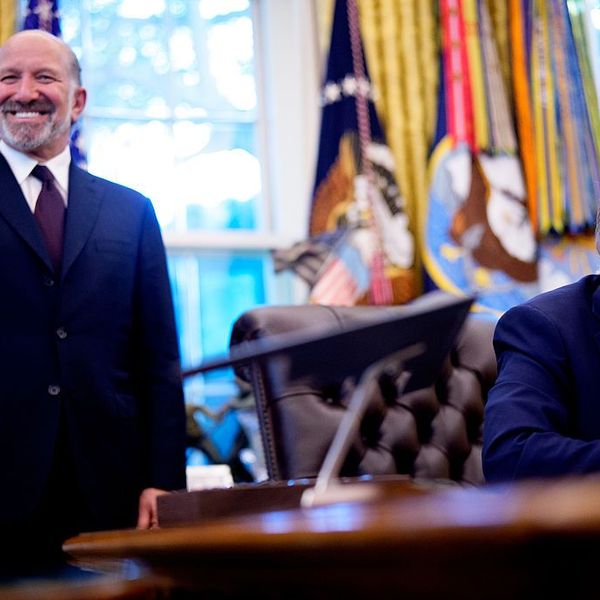Henry Paulson, the US Treasury Secretary, may have outdone even his own boss, George W. Bush, for sheer oracular idiocy. Bush, of course, set the standard with his laughable "Mission Accomplished" stunt concerning Iraq in May 2003. That one's right up there with Dick Cheney's fatuous claim in May 2005 that the Iraqi insurgency was "in its last throes."
But Paulson is clearly angling to get into the game. His entry was filed just over a week ago when he proclaimed, "The economy is as strong as I have seen it at any time in my 32 year business career." This was uttered two days after a 500+ point plunge in the stock market. The market's slide appears to be only beginning.
It is the sheer incongruity of Paulson's comment that is so breathtaking.
The economy lost 3 million manufacturing jobs during the first six years of Bush's parlous tenure. The housing market is in full-scale meltdown, with prices falling at the fastest rate in 35 years. There is no bottom in sight. Bush's tax cuts have forced the government to borrow more money than any in history: more than $3 trillion since he took office. And with the nation's savings rate below zero -- the first time since the Great Depression -- he's had to borrow more from foreigners than all previous presidents combined.
Is this what Paulson means by "the strongest economy in 32 years"?
Borrowing almost $3 billion every day from the likes of Korea, Taiwan, Japan, and China, our biggest industrial competitors, might be called the Blanche Dubois method of economics: throwing ourselves on the mercy of strangers. It may seem like good policy to Paulson but it undermines the US's own financial sovereignty.
Those competitors can decide at any minute to shut off the financial oxygen at which time our economy will utterly collapse. That's what happened in October 1987 when the Japanese closed the spigot on Reagan's damaging debt parade, causing the greatest single-day drop in the stock market since 1929. It's not an accident that the 500+ point meltdown on Wall Street followed a 9% plunge in the Shanghai stock market the day before.
Five million more people are in poverty since Bush took office. "Deep" poverty is up 26% to the highest level in 32 years. Seven million more people are without insurance. Oil prices are almost triple what they were when Bush took office. They are slowly but surely rendering obsolete a vast portion of the U.S. capital stock, built for a time of much lower prices. U.S. automakers have closed more than 20 plants in the last two years and have paid severances to over 100,000 workers.
Is this what Paulson means by "the strongest economy in 32 years"?
Income inequality is the greatest it's been since the 1920s, just before the Great Depression. This is why Bush has to run such massive deficits: the American people simply don't have enough money any more to clear the markets of goods. They've had to hock their houses with second and third mortgages to try to sustain a lifestyle they can no longer afford but cannot bear to give up. Mortgage debt is up over $7 trillion since Bush took office. But with the housing bust turning into a full-fledged rout, collapsing home prices are driving the "wealth effect" in reverse. It is wiping out the ephemeral equity millions of Americans have been counting on to fund their retirement.
Speaking of which, Paulson himself was just out on the road claiming that the government cannot afford the retirement commitments it has made for decades to Baby Boomers. "Entitlements," Paulson lectured, meaning payments for Social Security and Medicare, will have to be reduced. Economist Lawrence Kotlikoff, writing for the St. Louis Federal Reserve Bank, recently stated the U.S. government faces $65 trillion more in such obligations than it can possibly pay. B this measure, he argues, the U.S. government may already be "actuarially bankrupt."
The annual trade deficit has exploded from $377 billion when Bush took office to $763 billion last year, giving foreigners more that $3 trillion of additional claims on U.S. properties. Foreigners already own more than 20% of all U.S. assets. The deficit with China alone topped $230 billion last year. The nation's infrastructure -- the network of roads, bridges, ports, water systems, etc. -- on which the entire economy rests and operates, has been downgraded from "D+" to "D" status by the American Society of Civil Engineers. Meanwhile, we lavish close to a trillion dollars a year on various forms of military spending and wars of choice.
Is this what Paulson means by, "the strongest economy in 32 years"?
Of course, from Paulson's privileged vantage, as one of the financial titans of his age, things actually are going great. Corporate profits are at their highest share of national income since 1948. The top 1% of income earners -- those Bush calls his "base" -- saw their average pay increase by $146,000 last year. (Yes, that's just the increase.) Bush's policies have engorged the coffers of the weapons makers, pharmaceutical, and oil companies, all traditional Republican constituencies.
Higher economy-wide interest rates borne of higher economy-wide debt have shifted trillions of dollars from hard-strapped borrowers to elated lenders, Paulson's brethren. And investment banking giant Goldman Sachs, where Paulson most recently served as CEO, just announced a 29% increase in profits, to $3.2 billion for the quarter. What's not to like?
Paulson's divinations about the rosy state of the economy have about them the same delusional detachment that Marie Antoinette displayed at the Paris bread riots in 1789. Told by her handmaids why the women were rioting, she famously replied, "Let them eat cake." Of course, she, being only 14 years old, didn't remember Louis XV's ominous prophecy of only 15 years before: "Apre moi, le deluge." After me, the deluge. Paulson almost surely doesn't remember it either. He should.


